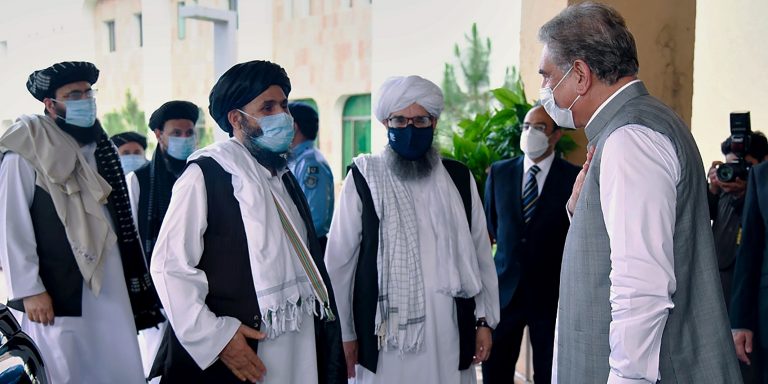INTELBRIEF
September 10, 2020
IntelBrief: Afghan Peace Talks and Uncertainty over the Taliban’s Commitment

Bottom Line Up Front
- After clearing the latest hurdle of a prisoner swap between the Afghan government and the Taliban, there will now be a push to capitalize on the momentum to move forward with peace talks.
- The most uncertain part of this deal is whether, and to what extent, the Taliban will actually sever ties with al-Qaeda militants operating in Afghanistan and Pakistan.
- The Afghan government will be negotiating an end to the conflict in parallel to the U.S. troop drawdown, with many concerned over a spike in violence by a range of spoiler groups, including ISKP or the Haqqani network.
- External states like Russia would like to see the United States remain bogged down in Afghanistan, while regional heavyweights, including Iran and Pakistan, will increase their involvement to extend their own influence.
After clearing the latest hurdle of a prisoner swap between the Afghan government and the Taliban, there will now be a push to capitalize on the momentum to move forward with peace talks. The prisoner exchange itself has been criticized by observers, noting that it was uneven, and that the Taliban was largely favored in the swap. Reports suggest that recently released prisoners have simply returned to the battlefield and rejoined the insurgency. This comes as fighters and commanders seek to exacerbate tensions over the Taliban’s willingness to join a power-sharing arrangement with the Afghan government as a cornerstone of any peace deal. Nevertheless, negotiations may soon resume in Doha, Qatar, where the Qatari government has been mediating the talks between myriad parties to the conflict. As negotiations have inched forward, the Taliban has continued to launch regular attacks in Afghanistan, changing tactics from mass casualty attacks to targeted assassinations meant to eliminate political rivals and intimidate any opposition. An attack this week in Kabul targeted Afghan Vice President Amrullah Saleh, who survived a roadside blast, which killed ten others. So far, there has been no claim of responsibility. The Taliban’s ability to operate with relative impunity also undermines the legitimacy of the Afghan government and demonstrates how unstable the country remains.
Even if the deal moves forward, many are skeptical about the Taliban’s political will to uphold its end of the bargain. As part of the agreement, the Taliban must commit to preventing Afghanistan from once again becoming a launching pad for transnational terrorism. The most uncertain part of this deal is whether, and to what extent, the Taliban will actually sever ties with al-Qaeda militants operating in Afghanistan and Pakistan. A recent report by the United Nations suggested that earlier this year, al-Qaeda leader Ayman al-Zawahiri personally negotiated with senior Afghan Taliban leadership to obtain assurances of continued support. And while the Taliban appears to be moving forward with the Afghan peace talks, the group has neither publicly renounced al-Qaeda, nor took any tangible actions to limit al-Qaeda in Afghanistan. It has been documented that fighters from al-Qaeda in the Indian Subcontinent (AQIS) have been embedded alongside Taliban units.
There could be pressure from the Trump administration to withdraw more U.S. troops before the November 2020 presidential election. A reduced U.S. presence would provide groups like Islamic State Khorasan Province (ISKP) with more operational space, especially in parts of eastern Afghanistan along the border with Pakistan. The strength of ISKP has ebbed and flowed, but if nothing else, the group has retained the ability to launch spectacular attacks against Afghan security forces in the capital, Kabul. The Afghan government will be negotiating an end to the conflict in parallel to the U.S. troop drawdown, and many are concerned about a spike in violence by a range of spoiler groups, to include ISKP or elements linked to the Haqqani network. There is also the possibility that disenfranchised Taliban fighters, unhappy with the peace deal, could defect and join groups like ISKP, reinforcing its ranks at a critical juncture in the conflict.
The recent controversy surrounding the Russians paying bounties to Taliban fighters to kill U.S. troops has only added to the controversial presence of U.S. troops in Afghanistan after nearly two decades of fighting. External states like Russia would like to see the United States remain bogged down in Afghanistan. Other regional heavyweights, including two of Afghanistan’s neighbors—Iran and Pakistan—will likely increase their involvement, respectively, as both countries seek to extend their own influence with the future Afghan government while protecting their national interests. Nineteen years after the United States was attacked by terrorists using Afghanistan as a safe haven, the country remains at risk for becoming a hub of violent extremism and radicalization. Whether an historic Afghan peace deal can change this calculus remains to be seen, but there are plenty of signs pointing to continued volatility, as U.S. leverage is attenuated and conflict dynamics evolve in ways unfavorable to Washington and its allies.